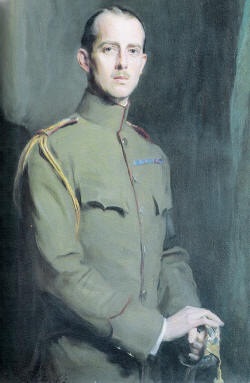Queer Places:
Tatoi Royal Cemetery, Acharnes 136 72, Greece
 Prince
Andrew of Greece and Denmark (2 February [O.S.
20 January] 1882 – 3 December 1944) of the
House of Schleswig-Holstein-Sonderburg-Glücksburg, was the seventh child
and fourth son of King
George I of Greece and
Olga Constantinovna of Russia. He was a grandson of
Christian IX of Denmark and father of
Prince Philip, Duke of Edinburgh. He was from birth a prince of both
Denmark
and Greece
by virtue of his patrilineal descent. Andrew had always lived a lascivious
lifestyle, carrying on one affair after another with both men and women, so it
is not surprising that he largely ignored his wife and children.
Prince
Andrew of Greece and Denmark (2 February [O.S.
20 January] 1882 – 3 December 1944) of the
House of Schleswig-Holstein-Sonderburg-Glücksburg, was the seventh child
and fourth son of King
George I of Greece and
Olga Constantinovna of Russia. He was a grandson of
Christian IX of Denmark and father of
Prince Philip, Duke of Edinburgh. He was from birth a prince of both
Denmark
and Greece
by virtue of his patrilineal descent. Andrew had always lived a lascivious
lifestyle, carrying on one affair after another with both men and women, so it
is not surprising that he largely ignored his wife and children.
He began military training at an early age, and was commissioned as an
officer in the
Greek army. His command positions were substantive appointments rather
than honorary, and he saw service in the
Balkan
Wars. In 1913, his father was assassinated and Andrew's elder brother,
Constantine, became king. Dissatisfaction with his brother's neutrality
policy during
World
War I led to his brother's abdication and most of the royal family,
including Andrew, was exiled. On their return a few years later, Andrew saw
service as Major General[2]
in the
Greco-Turkish War (1919–1922), but the war went badly for Greece, and
Andrew was blamed, in part, for the loss of Greek territory. He was exiled for
a second time in 1922, and spent most of the rest of his life in France.
By 1930, he was estranged from his wife,
Princess Alice of Battenberg. His only son,
Prince Philip, served in the British navy during
World War II, while all four of his daughters were married to Germans,
three of whom had
Nazi
connections. Separated from his wife and son by the effects of the war, Andrew
died in
Monte
Carlo in 1944. He had seen neither of them since 1939.
He died in the
Hotel Metropole, Monte Carlo,
Monaco, of
heart failure and arteriosclerosis just as the war was ending.[5]
Andrew was at first buried in the Russian Orthodox church in Nice, but in 1946
his remains were transferred, by the
Greek cruiser Averof, to the royal cemetery at
Tatoi Palace, near Athens.[37]
Prince Philip and then-private secretary, Mike Parker, traveled to Monte Carlo
to collect items belonging to his father from Countess
Andrée de La Bigne; among these items: a
signet ring which the Prince wore from then onwards, an ivory shaving
brush he took to using, and some clothes he had adapted to fit him.[3]
Prince Andrew left to his only son seven-tenths of his estate, but he also
left behind a debt of £17,500, leading Philip's maternal grandmother,
Victoria, Marchioness of Milford Haven, to complain bitterly of the
extravagance the Greek prince had been led into by his French mistress.[3]
My published books:


BBACK TO HOME PAGE
- https://en.wikipedia.org/wiki/Prince_Andrew_of_Greece_and_Denmark
- http://gayinfluence.blogspot.com/2011/08/prince-andrew-of-greece.html
 Prince
Andrew of Greece and Denmark (2 February [O.S.
20 January] 1882 – 3 December 1944) of the
House of Schleswig-Holstein-Sonderburg-Glücksburg, was the seventh child
and fourth son of King
George I of Greece and
Olga Constantinovna of Russia. He was a grandson of
Christian IX of Denmark and father of
Prince Philip, Duke of Edinburgh. He was from birth a prince of both
Denmark
and Greece
by virtue of his patrilineal descent. Andrew had always lived a lascivious
lifestyle, carrying on one affair after another with both men and women, so it
is not surprising that he largely ignored his wife and children.
Prince
Andrew of Greece and Denmark (2 February [O.S.
20 January] 1882 – 3 December 1944) of the
House of Schleswig-Holstein-Sonderburg-Glücksburg, was the seventh child
and fourth son of King
George I of Greece and
Olga Constantinovna of Russia. He was a grandson of
Christian IX of Denmark and father of
Prince Philip, Duke of Edinburgh. He was from birth a prince of both
Denmark
and Greece
by virtue of his patrilineal descent. Andrew had always lived a lascivious
lifestyle, carrying on one affair after another with both men and women, so it
is not surprising that he largely ignored his wife and children. 